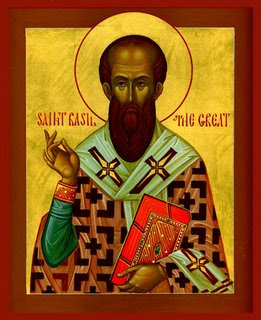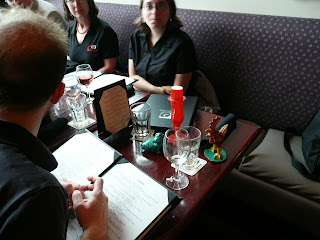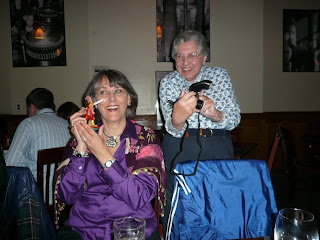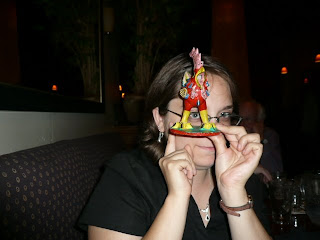
Today we celebrate the lives of two Saints, two Saints who were quite different from each other, two Saints who were very important to the fledgling Church, two Saints who were Apostles and Martyrs, two Saints who gave their all for their Lord. They are examples of two people who took up their cross and decided that Jesus was more important than their families. They came from different backgrounds, they had different methods of evangelism, and they didn’t always get along very well, but they were so important to the emerging Christian faith.
Simon Peter was a fisherman, a large, burly, solid guy who was nicknamed Cephas, which is Aramaic for Peter, or “Rocky.” He was inclined to open his mouth without thinking, and he would often say things which would come back on him. He was a down-to-earth person, not really given to mystic visions. Although he certainly received his share of visions he didn’t always understand what was going on; when he witnessed the Transfiguration of Christ, he wanted to build little huts for Jesus, Moses, and Elijah and he didn’t seem to really understand that Jesus was revealing his divinity. If the Twelve were the Inner Circle of Jesus’s disciples, Peter was in the “Inner Inner Circle;” he was present at all the events in which Jesus had just a few special persons with him. Peter was the one who confessed that Jesus was the Christ, the Messiah, the Promised One, and he claimed that he would follow Jesus anywhere. When Jesus was being arrested by the soldiers, Peter pulled out his sword and lopped off a servant’s ear, but not too long later he denied Christ three times; at the moment when Jesus really needed him, he, like the rest of the Twelve, was no where to be found. But Peter was the first of the men to see the empty tomb, and he was commanded by the Resurrected Christ to “feed my lambs.” When the Holy Spirit descended on Pentecost, Peter was the one to speak to the crowd. He became the leader of the Apostles, the leader of the Twelve, but he was not the leader of the Church; Jesus’ brother James was the leader of the Church in Jerusalem, but Peter was a leader of the Church. He may have been the bishop of the Church in Rome, but the Church in Jerusalem was considered THE Church in those days. Rome didn’t become such an influential and important Church until the third century. Peter was the greatest miracle worker of the Apostles, he was involved in many healing miracles. Jesus told Peter that “someone else will fasten a belt around you and take you where you do not want to go,” and Peter went to a lot of places that he didn’t want to go; I’m sure he didn’t want to be the one on the roof seeing a sheet full of un-clean animals being lowered and told “Kill and eat!” and I’m sure he didn’t want to be the one to feel Paul’s wrath regarding circumcision and other Jewish practices which were part of the earliest Church. I’m not sure that he particularly enjoyed being caught in the middle between Paul and his fights with the Hebrew faction of the Church But he willingly went to his martyrdom, crucified head down in the Colosseum in Rome according to tradition, and he was the Rock on which the Church was established, tradition stating that he started the church in Rome and was even the first Bishop of Rome.
Saint Paul was quite a different person than Peter; he was an educated man, a Pharisee educated by the great Rabbi Gamaliel, and a Roman citizen. He was not one of the Twelve, in fact, he persecuted the Twelve, as Saul he witnessed and may have even been the ring-leader at the stoning of Stephen the Deacon, but he became one of the greatest of the Apostles. He was very much given to mystic experiences, in fact, his conversion on the Damascus Road is the result of a vision of the Resurrected Christ, and he remained blinded for several days as a result of this vision. Paul also claimed to have visited some “higher heavens,” and he articulated many of the more mystical aspects of Christology. Paul was a persistent persecutor of the Church by his own admission, but once converted, once he “saw the light,” he was one of the most ardent devotees of Jesus, he traveled the so-called “known world” and brought the Good News to the Gentiles. He was chased out of town, he was arrested, and he would preach to anyone who would listen. He founded churches throughout the Greco-Roman world, and he may have traveled as far as Spain on his missionary journeys. He would fight with the Hebrew faction of the Church, and he always seemed to think that Peter was easily led by whatever faction he happened to be with at the time, but even though he was not always in good stead with the Home Office back in Jerusalem, he gladly raised money for the poor and the Jerusalem Church. He was a prolific letter writer, (just imagine what HE would have done with e-mail) and his letters, even when chiding, were so beloved by the churches that they were shared with the rest of the faithful, and Paul’s epistles became the very first Christian scriptures, before any gospels were written and before the letters attributed to John and Peter. Tradition tells us that Paul, like Peter, was martyred in Rome, and that he was be-headed. The relics of Peter and Paul became powerful symbols of the Church in Rome, and they were moved from their original resting places to a catacomb in Rome where a basilica was later erected over their remains. Paul’s teaching on grace, on salvation, and on the resurrection of the dead formed the earliest theology of the Church, and it is not too far off the mark to call him the founder of Christianity.
These two mighty Men of God are proof that God can work through anybody. The fact that someone like Simon Peter, a brash, thick-headed fisherman, inclined to say what ever popped into his mind with out thinking, and a well educated but irritable Pharisee, a persecutor of the Church and later its great champion, could both help spread the Good News of the forgiveness of sins and the coming of the Reign of God, that these two extremes could allow the Holy Spirit to work through them and help spread the message of Christ throughout the world is proof that God can work through each one of us here as long as we are willing to answer “yes” to God’s call. Jesus stood on a beach and asked Peter to follow him, later, the Resurrected Jesus stood on a beach and asked Peter to feed his sheep. Peter said “yes” both times. Jesus appeared to Saul in a blinding light and called him to end his persecutions. Saul answered yes to Jesus’ call and became Paul, a great missionary and the first theologian. Very few of us have such experiences, but Jesus calls all of us to follow him. Jesus calls each one of us to follow him, to care for the hungry and the sick and the poor and the prisoner and the stranger. Jesus calls each of us to love one another, and Jesus calls all of us to serve each other as we serve God. God worked through men like Peter and Paul, and God can work through each one of us; all we must do is answer “yes” to God’s call and then allow the Holy Spirit to move and work through us. May we all take the examples of Peter and Paul, and answer “yes.”
Almighty God, whose blessed apostles Peter and Paul glorified you by their martyrdom: Grant that your Church, instructed by their teaching and example, and knit together in unity by your Spirit, may ever stand firm upon the one foundation, which is Jesus Christ our Lord; who lives and reigns with you, in the unity of the Holy Spirit, one God, now and for ever. Amen.




.jpg)




























































